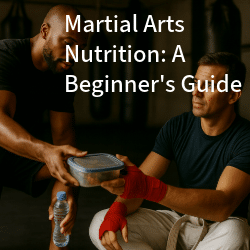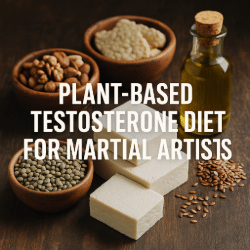TL;DR
Martial artist nutrition must support both strength and endurance, especially for Kung Fu training.
Protein (1.2–1.8g/kg) aids muscle repair; carbs (4–6g/kg) fuel training.
Pre-workout: Carbs + protein; post-workout: Protein + carbs.
Hydration is critical—16–24 oz per pound of sweat lost.
Recovery foods (collagen, omega-3s, turmeric) support joint health.
Meal plan ensures sustained energy and optimal recovery.
A well-structured diet ensures peak performance and longevity in martial arts training.
Optimizing Strength, Endurance, and Recovery
Introduction
Martial arts, particularly Kung Fu, require both explosive strength and sustained endurance. For amateur martial artists training three to five hours per week, nutrition plays a critical role in performance, recovery, and injury prevention. Unlike bodybuilding or pure endurance sports, Kung Fu and other martial arts require a hybrid dietary approach that fuels high-intensity movements, supports lean muscle maintenance, and enhances recovery.
This article explores the best dietary practices for amateur martial artists, from macronutrient distribution to meal timing and hydration. A comprehensive meal plan is also provided, ensuring optimal nutrition for both training and overall well-being.
Nutritional Demands of Martial Artists
Martial arts training incorporates high-intensity strikes, sustained sparring sessions, and complex movements requiring agility and balance. As such, it demands:
Energy for endurance – carbohydrates for sustained performance.
Protein for muscle recovery – essential for minimizing muscle breakdown and promoting repair.
Healthy fats for joint support and cognitive function – aiding longevity in training.
Micronutrients for recovery and hydration – essential vitamins, minerals, and electrolytes.
A well-balanced diet ensures a steady supply of energy, reduces fatigue, and enhances flexibility and coordination.
Macronutrient Requirements for Martial Artists
Protein: Muscle Repair and Recovery
Protein is crucial for muscle recovery after strenuous martial arts sessions. The recommended intake for amateur martial artists is 1.2–1.8g per kg of body weight per day. High-quality protein sources include:
Lean meats (chicken, turkey, beef)
Fish (salmon, tuna, sardines)
Eggs
Dairy (Greek yogurt, cottage cheese)
Plant-based options (lentils, quinoa, tofu)
Carbohydrates: Energy for Training
Martial arts require both short bursts of power and sustained effort. Carbohydrates provide the necessary glycogen stores to fuel performance. The recommended intake is 4–6g per kg of body weight per day, with a focus on:
Whole grains (brown rice, oats, quinoa)
Fruits (bananas, apples, berries)
Vegetables (sweet potatoes, leafy greens)
Fats: Joint Health and Cognitive Function
Healthy fats support hormonal balance, joint health, and cognitive function—key for martial artists. Recommended sources include:
Nuts and seeds (almonds, walnuts, flaxseeds)
Avocados
Olive oil
Fatty fish (omega-3 rich sources)
High-Altitude Nutrition for Martial Artists
Flagstaff and other high-altitude training environments introduce unique nutritional demands. Oxygen is scarcer, dehydration happens faster, and the body’s energy use changes.
Increased Caloric Needs: At elevation, the body burns more calories at rest and during training. Martial artists should expect to eat slightly more—particularly carbohydrate-rich foods—to maintain energy.
Hydration: Dehydration risk doubles at altitude because dry air speeds water loss. Electrolytes (sodium, potassium, magnesium) are essential to maintain fluid balance. Soups, broths, and mineral waters can help.
Iron Intake: Oxygen transport depends on hemoglobin, and iron supports hemoglobin production. Red meat, lentils, spinach, and fortified cereals should be part of the diet, particularly for those susceptible to anemia.
Antioxidants: Training at altitude increases oxidative stress. Brightly colored fruits and vegetables—blueberries, peppers, citrus—supply antioxidants that help limit cellular damage.
Protein: Muscle breakdown can accelerate at high elevations. Adequate protein, spaced evenly throughout the day, is critical for recovery.
A martial artist adapting to high altitude should think of food as both fuel and medicine, tailoring meals to counter the stresses of thin air and increased workload.
Meal Timing for Martial Artists
It isn’t just what you eat, but when you eat that shapes performance and recovery. Martial artists often train at irregular hours, making meal timing even more important.
Pre-Training Fuel (1–3 hours before): Aim for a balanced meal of slow-digesting carbohydrates (brown rice, oatmeal, or sweet potatoes) with lean protein (chicken, fish, tofu). This combination ensures steady energy release without sluggishness.
Immediate Pre-Training Snack (30–60 minutes before): If you’re short on time, choose light and easily digestible foods such as a banana with nut butter, or yogurt with berries.
During Training: For sessions under 90 minutes, water usually suffices. For longer or more intense sessions, small sips of electrolyte solutions can prevent fatigue.
Post-Training Recovery (within 30–60 minutes): Combine fast-digesting protein (whey shake, soy shake, or eggs) with quick carbohydrates (fruit, rice cakes, or white rice). This replenishes glycogen and aids muscle repair.
Evening Nutrition: If you train at night, avoid skipping recovery meals. Choose lighter proteins (fish, legumes) with vegetables and modest carbs to restore energy without disturbing sleep.
Dialing in meal timing can reduce fatigue, shorten recovery windows, and keep training consistent.
Hydration and Recovery Strategies
Martial artists must maintain proper hydration to optimize performance. Dehydration leads to fatigue, impaired cognitive function, and reduced muscle recovery. Hydration tips include:
Drinking 16–20 oz of water 2 hours before training.
Sipping water throughout training (or electrolyte drinks for intense sessions).
Replenishing 16–24 oz per pound of sweat lost after training.
Recovery strategies include incorporating collagen, omega-3s, and anti-inflammatory foods such as turmeric, ginger, and leafy greens to support joint health and reduce muscle soreness.
Sample Meal Plan for an Amateur Martial Artist
| Meal | Example Foods |
|---|---|
| Breakfast | Scrambled eggs with spinach, whole-grain toast, and avocado |
| Snack | Greek yogurt with mixed berries and walnuts |
| Lunch | Grilled salmon, quinoa, steamed broccoli, and olive oil dressing |
| Pre-Workout | Banana with almond butter |
| Post-Workout | Protein smoothie with banana, oats, and almond milk |
| Dinner | Stir-fried chicken with brown rice and mixed vegetables |
| Evening Snack | Cottage cheese with honey and flaxseeds |
This meal plan ensures balanced macronutrient intake, sustained energy, and optimal recovery.
Frequently Asked Questions
Here are some quick answers to common questions about nutrition for martial artists:
What should I eat before a martial arts training session?
Before training, eat a light meal or snack rich in complex carbohydrates and lean protein, such as oatmeal with nuts or a banana with peanut butter. This provides sustained energy without causing sluggishness.
How does hydration impact martial arts performance?
Staying properly hydrated improves endurance, reaction time, and recovery. Even mild dehydration can lead to faster fatigue and impaired coordination during training or sparring.
Are supplements necessary for amateur martial artists?
Most amateur martial artists can meet their nutritional needs through a balanced diet. Supplements like protein powder or electrolyte drinks may be helpful in specific cases, but they are not mandatory for success.
What are the best recovery foods after intense martial arts training?
After training, focus on foods high in protein and carbohydrates, such as grilled chicken with rice or a smoothie with yogurt and fruit. These help rebuild muscle and replenish energy stores.
How can I balance weight management with energy needs for martial arts?
To balance weight and energy, aim for nutrient-dense foods that provide vitamins, minerals, and sufficient calories without excess empty sugars or fats. Tracking portion sizes and maintaining regular meal timing can also help.
Scientific References
Tarnopolsky, M. A. (2008). “Protein requirements for endurance athletes.” Nutrition, 24(4), 324-334.
Thomas, D. T., Erdman, K. A., & Burke, L. M. (2016). “Position of the Academy of Nutrition and Dietetics, Dietitians of Canada, and the American College of Sports Medicine: Nutrition and Athletic Performance.” Journal of the Academy of Nutrition and Dietetics, 116(3), 501-528.
Sawka, M. N., & Pandolf, K. B. (1990). “Effects of body water loss on physiological function and exercise performance.” Comprehensive Physiology, 2(1), 97-113.
Tipton, K. D., & Wolfe, R. R. (2004). “Protein and amino acids for athletes.” Journal of Sports Sciences, 22(1), 65-79.
Related Articles
Martial Arts Nutrition: A Beginner’s Guide to Fueling Your Training
Nutrition for Male Kung Fu Practitioners Over 60
Nutrition for Joint Health: A Guide for Martial Artists
Aging, Testosterone, and the Martial Artist
Nutrition After Workouts: Recovery Tips for Martial Artists
Beyond Calories In, Calories Out: The Real Science of Weight Management



